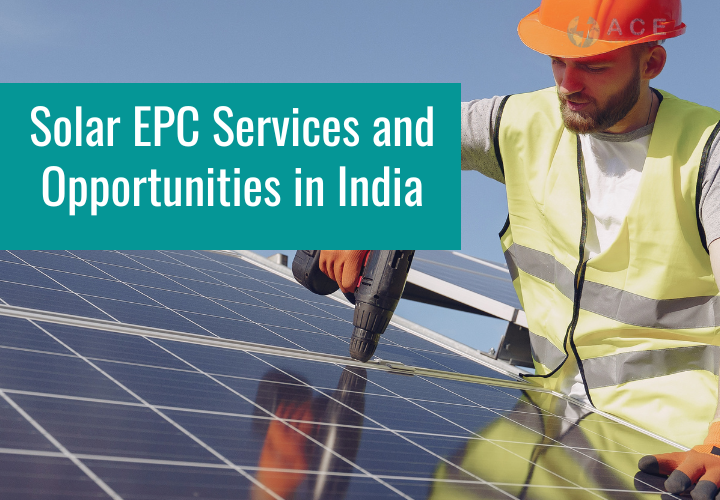
India is experiencing an unprecedented rise in the solar energy industry due to the country pursuing clean energy, sustainability and lowering its carbon footprint. At the core of this energy revolution is the Solar EPC (Engineering, Procurement and Construction) model, which is central to the realisation of the solar power projects.
In this blog we discuss the structure, scope and importance of solar EPC services, the rise of EPC companies in India and the emerging opportunities in this sector.
Overview of Solar EPC Services
Solar EPC companies generally deal with all stages of a solar project, starting from the designing and engineering to materials procurement to plant construction, etc. These firms guarantee delivery of projects on time and quality assurance as well as the smooth integration of systems with the grid or internal power systems.
Solar EPC contracts are important because they reduce the burden on clients by offering end-to-end project execution. Such services are:
- Feasibility studies
- Design and engineering
- Equipment procurement
- Installation and construction of sites
- Testing and commissioning
- Post-installation maintenance support
- Growth of EPC Companies in India
During the past ten years, the EPC companies in India have been increasing substantially owing to the favourable policies, decreasing solar panel costs, and the increasing demand for clean energy.
These firms have played a major role in helping India meet its renewable energy goals, which aim for 500 GW of non-fossil fuel capacity by 2030.
Solar EPC company models have diversified in both scale and services, from large utility projects in arid areas to rooftop installations in cities. The major players in this market now provide an integrated solution supporting residential, commercial, industrial, and governmental clients.
Key Components of Solar EPC
To understand the scope of services provided in solar EPC contracts, it is important to understand the key elements involved in it.
The three core aspects are:
Engineering: Includes planning, system design, and layout, considering site-specific requirements like terrain, solar irradiance, and utility connectivity.
Procurement: Involves sourcing high-quality solar panels, inverters, mounting structures, cabling and monitoring systems from trusted vendors.
Construction: Comprises site preparation, installation of solar arrays and electrical systems, and grid integration.
Trends in Solar Engineering and Design
India has experienced a fast technological growth in the field of solar engineering. The sector has progressed to single- and dual-axis tracking systems, which generate energy more efficiently, as compared to fixed-tilt systems used earlier.
Another major trend is digitalisation, where the project workflows are monitored using cloud-based platforms, and predictive maintenance ensures higher efficiency and lower downtime.
Opportunities in Industrial Solar Projects
India’s heavy energy consumption has presented a vast opportunity for every solar EPC company in India. Factories, warehouses, and processing units are increasingly turning to solar energy to cut down power expenses and meet ESG (Environmental, Social, and Governance) goals.
EPC firms can thus capitalise on this potential by offering:
- Customised plant designs and factory rooftops and adjacent land parcels
- Integration of energy storage to manage the peak load requirements
- O&M (Operations and Maintenance) contracts for the long term
Government Policies and EPC Demand
The solar industry in India has received support from governmental policies to a great extent. Such initiatives continue to fuel the demand for EPC companies, ensuring clearance for projects and funding from the authorities in question.
Supportive government schemes include:
- PM-KUSUM for farmers
- Rooftop solar subsidies
- Net metering policies
- Solar park development models
- Challenges Faced by EPC Companies
Despite the promising outlook, EPC providers face several challenges:
- Fluctuations in prices of modules due to global supply chain problems
- Land acquisition delays
- Dependence on imported machinery
- Payment delays from government tenders
- Intense competition resulting in shrinking profit margins
Future Outlook for the EPC Sector
The future of a solar EPC company in India seems bright. As India’s focus shifts to green hydrogen, energy storage systems, and global solar partnerships, EPC firms will find new verticals to grow. Market opportunities will also be boosted by the setup of community solar, floating solar plants and smart microgrids.
Collaborations with international companies and investment in R&D will give Indian companies a competitive edge in the global clean energy race.
Conclusion
EPC companies in India are thus leading the way towards the future of sustainable energy in the country. They make solar adoption feasible at all levels, from the rooftops of houses to the industrial megaprojects. Are you ready to enter the world of solar energy? Work with an experienced solar EPC company like us to set up your solar energy system while complying with regulations to guarantee long-term energy savings.

